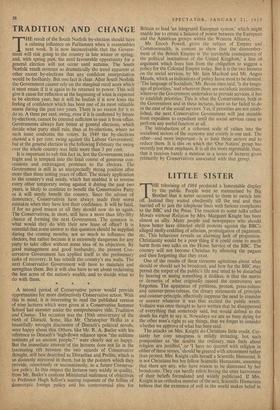TRADITION AND CHANGE
THE result of the South Norfolk by-election should have a calming influence on Parliament when it reassembles next week. It is now inconceivable that the Govern- ment will risk going to the country in late winter or spring; and, with spring past, the next favourable opportunity for a general election will not occur until autumn. The South Norfolk result reverses so dramatically the trend apparent at other recent by-elections that any confident interpretation would be foolhardy. But one fact is clear. After South Norfolk the Government cannot rely on the marginal rural seats which it must retain if it is again to be returned to power. This will give it cause for reflection at the beginning of what is expected to be election year; but it will be foolish if it now loses the feeling of confidence which has been one of its most valuable assets during the past two years. There is no reason for it to do so. A three per cent. swing, even if it is confirmed by future by-elections, cannot be counted sufficient to oust it from office. Governments always fare better at general elections, which decide what party shall rule, than at by-elections, where no such issue confronts the voters. In 1949 the by-elections showed a 6 per cent. swing against the Labour Government; bnt at the general election in the following February the swing over the whole country was little more than 3 per cent.
It is important to rub this fact in, lest the Government takes fright and is tempted into the fatal course of generous con- cessions and extravagant promises to the electors. The Government is still in an unexpectedly strong position after more than three testing years of office. The steady application to the country's real needs, which has enabled it to reverse every other temporary swing against it during the past two years, is likely to continue to benefit the Conservative Party as it will surely benefit the country. Since the advent of democracy, Conservatives have always made their worst mistakes when they have lost their confidence. It will be fatal, if for no good reason at all they should now do so again. The Conservatives, in short, still have a more than fifty-fifty chance of forming the next Government. The question is, what would they do with their new lease of office? It is essential that some answer to this question should be supplied during the coming months, not so much to influence the electors, but rather because it is extremely dangerous for any party to take office without some idea of its objectives. By good management and good husbandry, the present Con- , servative Government has applied itself to the preliminary tasks of recovery. It has rebuilt the country's sea walls. The next Conservative Government will have to maintain and strengthen them. But it will also have to set about reclaiming the lost acres of the nation's wealth, and to decide what to do with them. * * * Britain to lead 'an integrated European system,' which might enable her to create a balance of power between the European and the American groups within the Western Alliance. Mr. Enoch Powell, given the subject of Empire and Commonwealth, is content to show that the dismember- ment of the British Empire is 'the inevitable consequence of the political institutions of the United Kingdom,' a line of argument which frees him from the obligation to suggest a policy for the Colonial Empire today. But it is the two lectures on the social services, by Mr. lain Macleod and Mr. Angus Maude, which as indications of policy leave most to be desired. `The language of Socialism,' Mr. Bevan once said. 'is the langu- age of priorities,' and wherever there are socialistic institutions. wherever the Government undertakes to provide services, it has to establish priorities. This is what the Conservatives, both in the Government and in these lectures, have so far failed to do in the case of the social services. Yet, if priorities are not estab- lished, the next Conservative Government will just stumble from expedient to expedient until the social services cease to perform any useful function at all.
The introduction of a coherent scale of values into the socialised sectors of the economy and society is one task. The other—and more important—is to limit those sectors and to reduce them. It is this on which the 'One Nation' group has recently put most emphasis. It is all the more regrettable. then, that it receives barely a mention in a series of lectures given primarily by Conservatives associated with that group.


































 Previous page
Previous page